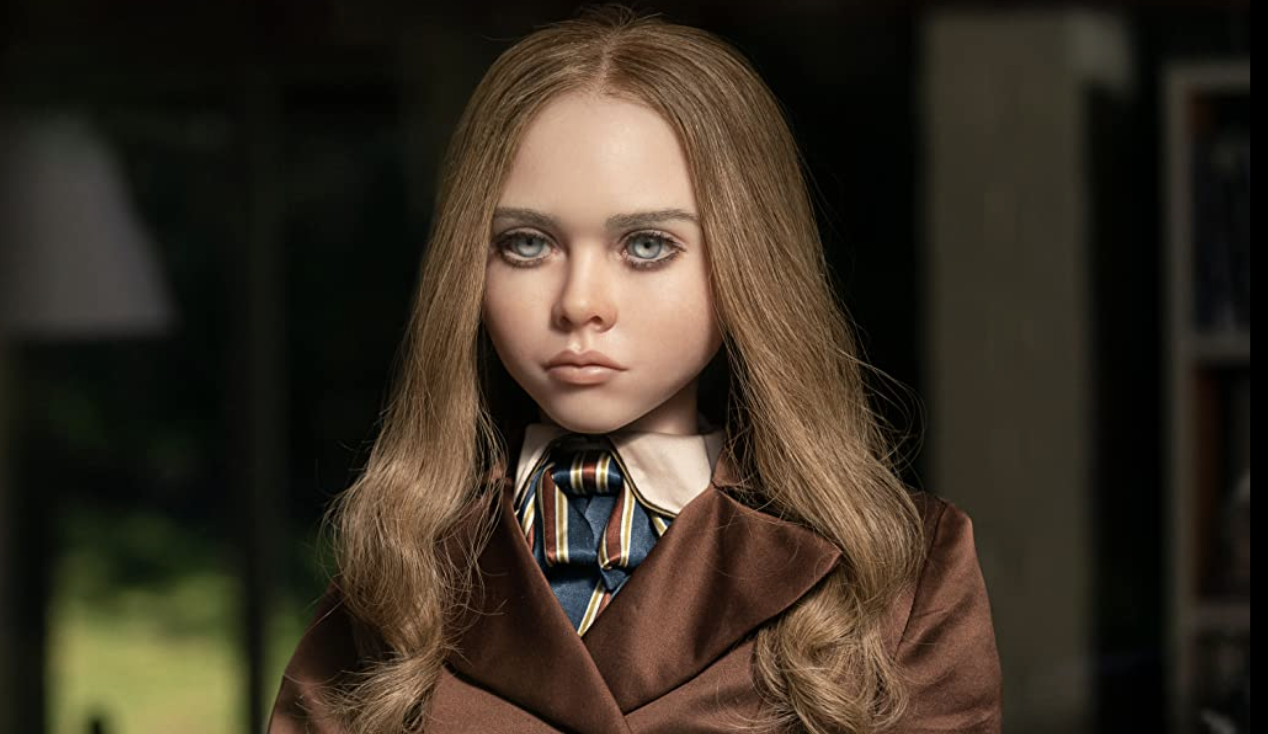The thing about dolls is, they all want to murder us.
Despite this well-established fact, a Seattle computerized toy designer named Gemma (Allison Williams) decides the market needs an AI-powered doll that will not only serve as a child’s loyal companion but can also learn from its interactions with humans. That obvious disaster in the making, as anyone who frequents TikTok or watched the halftime show for the Rams-Chargers game on New Year’s Day knows, is named M3GAN.
Designing potential killbots is not, strictly speaking, Gemma’s job. She’s been tasked with designing a cut-rate version of her company’s top-seller, Purrpetual Pets, a line of furry companions whose selling point is that they shit when you feed them. But on company time (and with company money), Gemma tinkers obsessively with M3GAN (short for "Model 3 Generative Android"), and her drive to succeed only accelerates when a nine-year-old moves in with her.
That kid is Gemma’s niece Cady (Violet McGraw), who has survived a tragic (and pretty funny) crash between car and snowplow that killed both her parents. A distracted workaholic (and up against a deadline too), Gemma is not only unprepared to be a caregiver but borderline unfit. She’s so incapable of relating to a child that she doesn’t even think at first to show Cady that there’s a homemade robot in her basement. It’s her niece’s enraptured response to this old, abandoned creation, named Bruce, that inspires Gemma to finish M3GAN.
Soon—maybe too soon, given the lack of testing Gemma undertakes—M3GAN is a reality. And once Cady bonds with the doll, both niece and aunt grow overdependent on this electronic nanny/bestie. All Cady’s emotional companionship needs are met, making human friendships unnecessary, and Gemma gets to cede her in loco parental duties and get back to work.
M3GAN reminds Cady to complete basic tasks, like flushing the toilet. She explains how condensation gathers on a water glass. She records Cady’s stories about her parents to preserve her memories. She dances. She sings creepy versions of pop songs. Oh, and she kills all those who seem to pose a threat to Cady. (This is where Gemma’s apparent decision to endow the toy with super-strength and inhuman dexterity reveals itself as a significant design flaw.)
M3GAN’s victims are hard to mourn—in real life you might not want them to die but in a slasher movie you wouldn’t want them to live. (There were several other unharmed characters I’d have been happy to see offed, honestly.) She poisons them, she skewers them, she hangs them, she… is there a single word that means “rip someone’s ear off”? Because she does that too. Still, you can’t market a toy that wreaks bloody vengeance on a child’s nemeses, so Gemma must inevitably square off against her creation in a climactic battle.
Screenwriters Akela Cooper and James Wan, the team behind the occasionally wretched, occasionally brilliant Malignant, go straight for laughs here. As Gemma, Williams is sufficiently oblivious and self-absorbed to fit her inadvertent Frankenstein/Geppetto role. And M3GAN herself (itself?) is a masterpiece of horror design, from the nattiness of her fabulous little preppie mean-girl outfits to the way her blank face assumes expressions of concern or malice. There’s a real pleasure in seeing a team nail the component that makes their movie effective.
In some ways, M3GAN is both a sharp satire of the amorality of the tech world and a touching story about an aloof adult and a traumatized child learning to care for one another. In other ways—in most ways—it’s a movie about a killer robot doll. We’re here to watch a four-foot algorithm-brained hellcat throw shade at humans then slash them to ribbons, after all. Still, though this ain’t After Yang or Robocop, there are moments of treacle-free emotional connection and not-dumb social commentary.
If anything, there are too many laughs and too few kills here. Am I a bloodthirsty deviant for thinking M3GAN deserved a higher body count? The movie was re-edited to meet PG-13 requirements—couldn’t deny admission to all those little TikTokers performing the viral M3GAN dance, after all—and that seems to have proven a wise box office decision. So I’m glad to hear that the film’s creators are already teasing a more violent unrated version. (Release the Han cut!) And maybe there will be a chance to shed more blood in the inevitable sequel, MEG4N.
****
Empress Elisabeth of Austria (Vicky Krieps) is meant to behave as sort of a doll herself. In director Marie Kreutzer’s Corsage (as in “corset,” not floral arrangements), it’s 1877 and the 40-year-old royal has had enough. Enough of being tautly laced into her bodice, of displaying the latest fashions, of enduring an elaborate hairdressing routine, all so she can look suitable for her dreary rounds of public appearances. And so she rebels. She smokes. She cuts her hair short. She flips the bird while leaving the dinner table. To avoid her duties, she’s even devised a convincing manner of pretending to faint.
The source of Elisabeth’s discontent is obvious: She’s an intelligent woman fated to live as a ceremonial ornament. Even the freedom she negotiates for herself proves unsatisfactory. Her would-be lovers disappoint her or become off-limits when rumors start to circulate. Her only solace comes when she meets motion picture camera inventor Louis Le Prince (Finnegan Oldfield). Fascinated by the technology, she allows him to film her repeatedly, and since the footage is, of course, silent, she’s free to mouth off any way she wants during the shoot. (We don’t get to hear what she says.)
Corsage’s strength is that Elisabeth is not strictly portrayed as an admirable proto-feminist, but rather as the consequence of stifled human growth. She exercises her freedom at the expense of others, taking her young daughter for a night ride on horseback that leaves the child with a fever or consigning her longtime confidante, against her will, to the grueling fate of impersonating her (behind a veil) at ceremonies. You can almost understand why her husband Franz Josef (portrayed a bit more kindly here than the historical record would suggest) and even children are disappointed in her unbecoming ways.
The life of Elisabeth has been the subject of a ridiculous number of films already, but Corsage is leagues ahead of the standard biopic conceptually. The cinematography is smarter too. The camera brushes without interest past the ornate luxury of the period settings, instead achieving a claustrophobic effect meant to mirror Elisabeth’s consciousness.
Despite all this, Corsage is a little dull, for reasons it’s hard to pin down. Partly it’s the unpunctuated rhythm of the film, which flows from incident to incident without ever quite cresting. And while the film’s willingness to rewrite history seems fair, anachronisms like the inclusion of 20th century pop songs (“Help Me Make It Through the Night” strummed on violin and “As Tears Go By” on harp) are random distractions.
Also, the strong suit of Krieps’s acting style—the distance she maintains from a viewer—works against her here. Krieps is a subtle actor, seeming to occupy an only intermittently accessible space within a character, which makes her ideal for ambiguous figures like Alma in The Phantom Thread or Clarisse in Hold Me Tight. But here Elisabeth often comes off as merely vague or unreadable.
Corsage suggests that seeking liberation leads one not always into valorous acts of self-expression but into acts of petulance and self-destruction, making Elisabeth something of a throwback to the Emmas and the Annas of the 19th century European novel. But Corsage refuses to play out as a tragedy either, Elisabeth meets her (fictionalized) fate on her own terms, just as Kreutzer and Krieps tell her story on their own terms.
GRADES
M3GAN — B+
CORSAGE — B
M3GAN and Corsage are now playing in area theaters.






